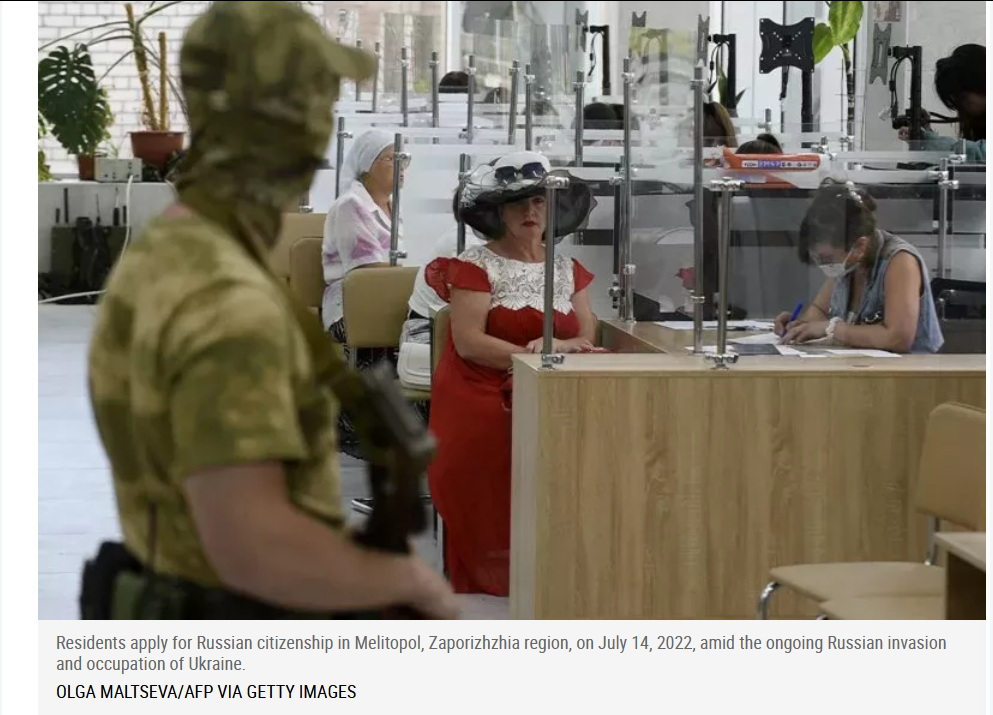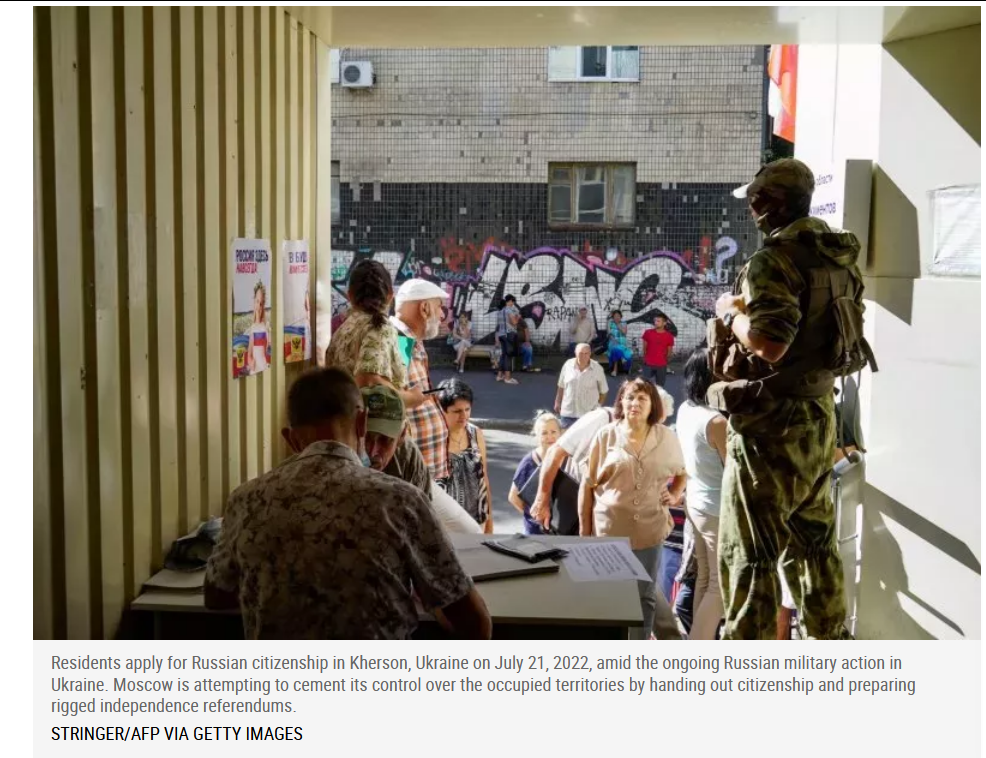
Ukrainians who fled Russian occupation in the south of the country are eagerly awaiting the promised counter-attack that Kyiv hopes will be a turning point in the ongoing war, though fear the death and destruction that retreating Russian units will leave behind.
As localized Ukrainian advances, deep strikes, and partisan operations set the stage for the planned liberation of Kherson Oblast and beyond, southerners—whose friends and families remain behind enemy lines—told Newsweek of their hope and trepidation.
Alexandra—who did not wish to reveal her full name fearing reprisal against friends and family still in the occupied territories—lived in the southern city of Mykolaiv until a few weeks ago.
The city, where Ukrainian defenders stopped the Russian advance early in the invasion, is now little more than 10 miles from the front line and shelled daily. “It became more and more dangerous every day, we constantly heard explosions,” she explained.
Alexandra fled to Kyiv with her grandmother, who before the invasion was living in a village in Kherson Oblast. That village was “completely destroyed by the Russian invaders,” she said.
Alexandra’s father is still living under occupation. Contact is increasingly difficult. “I am very worried about him, he gets in touch about once a month, since the Russians have restricted Ukrainian communication,” Alexandra said.
“Lack of work, constant terror from invaders, kidnapping, Russians can just break into your house and do whatever they want—these are all the realities of the occupation now.”
Viktoria—who also did not wish her full name to be published—lived with her family under occupation in the village of Alexandrovka on the border between Kherson and Mykolaiv regions.
“The village was in a war zone,” she told Newsweek. “As a result of shelling, our house was damaged. After the village was occupied, we stayed there for a week and left.”
Viktoria said she was unwilling to live side-by-side with the Russian invaders. The fighting knocked out water, gas, and electricity supply to the village, all while the threat of further violence loomed.
“You know what happened in Bucha and Hostomel, what happened in Mariupol,” Viktoria said. “There were no guarantees that the Russians would not arrange such horrors with us.”
Day-to-day life, Viktoria said, quickly became unbearable. “They break into the homes of people who have left and rob them. Ukrainian humanitarian aid is not allowed through, instead they import their own low-quality humanitarian aid, the products in it are often expired and spoiled.”
“Entrepreneurs and teachers, school directors are forcibly persuaded to cooperate, schools and universities forced to switch to the Russian curriculum. Dissenters are threatened with illegal dismissal or torture. People are forced to take Russian passports, newborn children are registered as Russians.”
“They almost completely disconnected all Ukrainian communications, the Internet, Ukrainian television is turned off. Instead, they host their own Russian Internet, which they completely control. Farmers are forced to sell products to Crimea at extremely low prices.”
“At checkpoints, people are constantly being searched, especially men. They strip them to the waist looking for tattoos. If a man or woman is involved in law enforcement or the anti-terrorist operation [i.e. the years-long Ukrainian government’s fight against Russian-led separatists in the Donbas], they are taken away in an unknown direction.”
More than 1 million Ukrainians are reported to have been forced through so-called “filtration camps” and relocated to Russia, including hundreds of thousands of children. Russian troops are also forcing local men from across the occupied territories into military service, where they face high casualty rates.
Disappearances are common. The exiled mayor of occupied Melitopol, Ivan Fedorov—himself detained briefly before being freed in a rescue operation—told Newsweek that at least 500 people have been kidnapped by Russian forces in the city since the occupation began.
Fedorov added that the 50 percent of Melitopol residents who stayed—around 60,000 people—face soaring unemployment, rising prices, electricity outages, and food shortages.
“It’s not a good life,” the mayor said.
Conditions are also deteriorating for those still in Kherson, Viktoria said. “Food prices are very high. They have not agreed to live according to the conditions of the Russians. But getting out is not easy either.”
“The columns of cars that want to leave are in queues in the field for weeks. There is a high risk of being shot at. They live in fear, because they don’t know what might come into the heads of the Russians tomorrow.”
Stubborn Resistance
Russian troops faced fierce protests from the very beginning of their occupation of Kherson and other settlements. What began as street demonstrations has morphed into a well-resourced partisan movement across the southern regions.
Top collaborators have been killed, railways and bridges bombed, and Ukrainian long-range artillery directed down onto key Russian targets by local spotters.
Fedorov predicted that local partisans will make Russia’s planned faux-independence referendums “impossible,” and credited local activists with two strikes on Russian bases around Melitopol earlier this week.
Threatening leaflets are constantly posted in the streets of major cities. Websites have been set up offering bounties for Russian troops and local proxies.
These images, provided to Newsweek by a local source, show anti-Russian posters distributed by partisans in the southern Kherson Oblast, Ukraine. One declares, “Orcs, get ready – death awaits you!” Anonymous
“They want to come back to Russia but their generals say to them, ‘Stay, everything will be good,'” Fedorov said of Russians occupying his city. “But it’s impossible for them to be good in Melitopol.”
Meanwhile, Ukrainian authorities are preparing to go after those supporting the Russian occupation. Fedorov said he has 500 names of collaborators provided by locals.
The Russian advance has been characterized by massed, devastating, and indiscriminate artillery fire. Villages, towns, and cities are pulverized by Russian guns before troops and armored vehicles move in to occupy. In the south and in the east, Ukrainian settlements have been wiped off the map.
After Russian troops were forced from Kyiv’s northern suburbs in April, Ukrainian authorities found evidence of harrowing crimes against the local population that fell under Russian occupation.
Roman Kostenko, a member of Ukraine’s parliament currently serving on the front line close to his native Kherson, told Newsweek: “We cannot ignore the possibility of the Russians committing the terrorist acts that we saw in Bucha, Irpin and other places, as we push them out.”
“We saw the videos of what they do with their war prisoners—the mutilations, the cold blooded murder and mass killings of war prisoners in Olenivka. Russia is a state sponsor of terrorism. So of course, we are worried.”

“Our relatives and friends who are now under occupation are waiting for a counter-offensive,” Viktoria said, “but we are ready to wait as long as possible so that there are as few casualties as possible among the Armed Forces of Ukraine and the civilian population.”
“We are very worried about the life and health of our loved ones because the Russians, retreating, leave scorched earth behind them.”
“Our family and friends stock up on food and water, and prepare shelters. They understand all the risks and try to prepare as much as they can. But it’s impossible to be prepared for everything, considering that the Russians use the civilian population as human shields.”
Some 12 million Ukrainians have been forced from their homes by Russia’s invasion. Most want to go home eventually, a recent United Nations study found, but many will have nothing left to return to.
“We plan to return home, but we do not know how soon this will happen because Alexandrovka was almost completely destroyed,” Viktoria said. “It will take a very long time to restore the village and infrastructure in it.”
Reconstruction will be the top priority for local authorities. “Our team is ready to repair,” Fedorov said. “We know that first the soldiers must do their task.”
By David Brennan AND Yevgeny Kuklychev https://www.newsweek.com/ukraine-war-russia-behind-enemy-lines-terror-kidnapping-1732861




